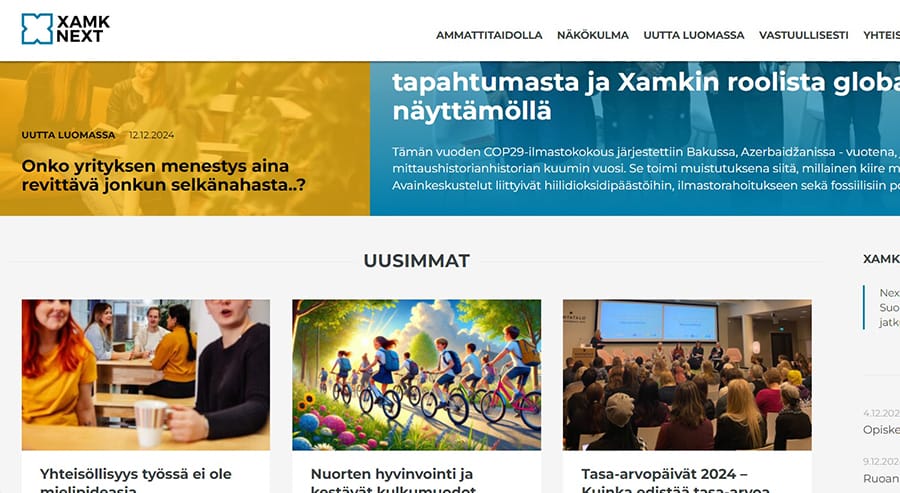INGENIUM Healthy Campus guidelines are calling for a whole-campus approach to promote wellbeing
One of the tasks of the INGENIUM University was to set common guidelines for creating a culture of wellbeing on campuses. The settings-based approach to health promotion highlights the role of Higher education institutions (HEIs) in promoting health and wellbeing. INGENIUM Healthy Campus guidelines provide an overview of the Healthy Campus framework and present the best practices established on promoting wellbeing in the HEI’s of the Alliance. In addition, the guidelines give future recommendations for promoting the health and wellbeing of the campus community, emphasizing the whole-campus approach.
What is a Healthy Campus?
World Health Organizaton (WHO) has declared in the Ottawa Charter (1986) that ”health is created and lived by people within the settings of their everyday life; where they learn, work, play, and love”, which brings forward the settings-based approach to health promotion. Healthy Universities and Healthy Campuses are one type of settings, where healthy setting approach has been implemented (WHO 2024). Additionally, Okanagan Charter (2015) calls for HEIs to promote a whole-campus approach and integrate health into all everyday actions, including business practices and academic programs.
A Healthy Campus has also referred as a “campus that adopts a holistic understanding of health, takes a whole-campus approach and aspires to create a learning environment and organizational culture that enhances the health and wellbeing of its community and enables people to achieve their full potential” (Healthy Campus Charter and Framework Ireland n.d.).
Where are we now on our way to Healthy Campus?
The INGENIUM University members have some national Healthy Campus frameworks, some of which are more established, and others that are still evolving. And while there might not be an official national Healthy Campus framework, there may still be lots of health promoting actions in the HEI. The best practices of the Alliance are introduced in the guidelines, including samples for active lifestyle, high risk behavior prevention, built environment, support for stress management and study capability, embedding wellbeing courses in academic curricula and sustainability practices. The samples represent the broad and holistic view of promoting health and wellbeing.
It’s also acknowledged that the HEIs of INGENIUM may be in different stages promoting Healthy Campus initiatives and activities. For this purpose, the guidelines have been created so that all the HEIs of the Alliance can commit to them. On the other hand, it also gives the opportunity to continue learning from each other and develop future actions together.
INGENIUM recommendations for promoting Healthy Campus
Common challenges were recognized across the INGENIUM University in promoting health in HEIs. For example, students’ workload and combining studies and other aspects of life was found to cause a barrier to participating extracurricular health and wellbeing activities. Therefore, it would be important to integrate the health promotion activities into academic programs and curriculum. It was also concluded that to raise awareness on health and wellbeing, it is important to find and define the best ways to communicate about health-related issues in the campus community.
In addition, when creating a Healthy Campus, the environment and the design of the premises should be considered in terms of wellbeing. The environment (built, social and virtual) should support healthy behavior and there should be comfortable and suitable facilities for various needs, such as independent work/study, group work, socializing, relaxation etc.
One thing that may challenge the integration of the Healthy Campus initiatives is, that the health and wellbeing promotion might be seen as extraneous actions rather than part of HEI’s core business – although there is good will to support the wellbeing initiatives. Therefore, management’s engagement to health promotion was found crucial. First, to ensure sufficient resources in the long term instead of short time projects. Second, to adopt the whole campus approach, where all aspects of campus life and all members of campus community are promoting and supporting health and wellbeing. Everyone in the campus community are the main beneficiaries of wellbeing approaches and activities, as they have an impact on for example study / work satisfaction, sense of belonging, study capability, graduation rates and academic success as also staff’s engagement and productivity.
Still, it’s important to note that it’s a different thing to just “tick a box” when looking at the Healthy Campus recommendations, than truly consider health and wellbeing aspects in all everyday operations.




